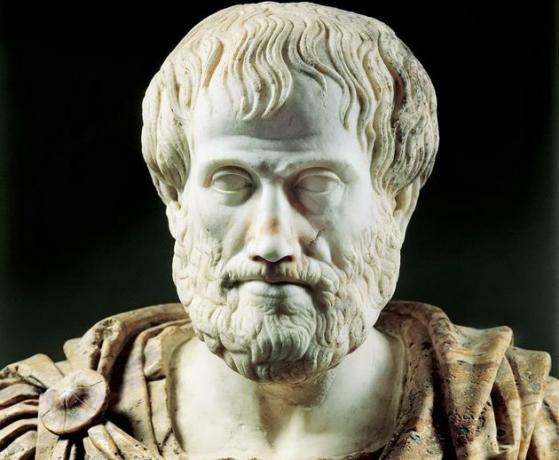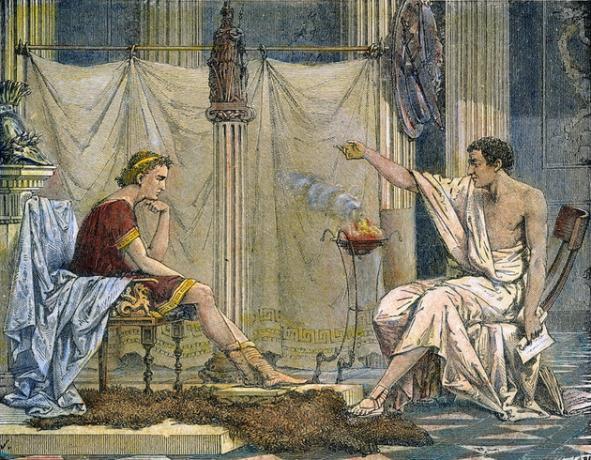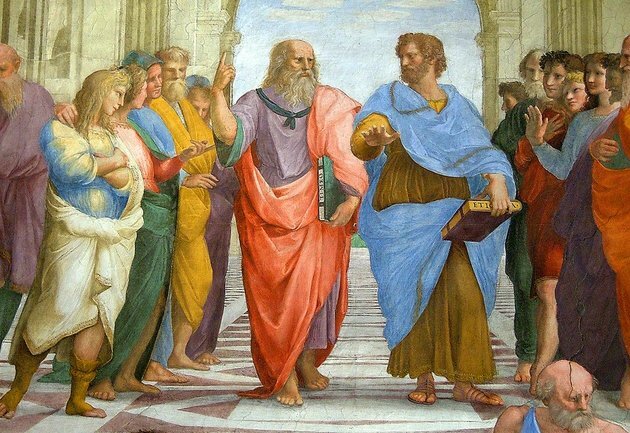Aristotle (384 a. C.-322 a. C.) was one of the most important Greek philosophers and the main representative of the third phase of the history of Greek philosophy “the systematic phase”.
He wrote a series of works that talked about politics, ethics, morals and other fields of knowledge and was a teacher of Alexander the Great (356 a. C-323 a. Ç.).
Aristotle's Biography
Aristotle was born in Stagira, Macedonia, in 384 BC. Ç. At the age of 17, he left for Athens and began attending Plato's Academy. On account of his birthplace the author is commonly called "the Stagirite".
Of aristocratic origin, he was admired for his refined behavior and intelligence. He soon became the master's favorite disciple, who observed:
“My Academy is composed of two parts: the students' bodies and the brain of Aristotle”.
With the death of Plato, in 347 a. C., the brilliant and famous student considered himself the natural substitute of the master in the direction of the Academy. However, he was rejected and replaced by a born Athenian.

Disappointed, he left Athens and left for Atarneus, in Asia Minor – then Greek. He was an adviser of state to a former colleague, the political philosopher Hermias.
He married Pythria, the adopted daughter of Hermias, but when the Persians invaded the country and killed their ruler, he was left homeless again.
In 343 a. C., was invited by Philip II of Macedonia to tutor his son Alexander. The king wanted his successor to be an exquisite philosopher. Thus, as preceptor at the Macedonian court for four years, he had the opportunity to pursue his research and develop many of his theories.
When he returned to Athens, in 335 a. a., Aristotle decided to found his own school called Liceu to be located in the building dedicated to the god Apolo Licio.
In addition to technical courses for the disciples, he taught the people in general. At the Liceu, they studied geometry, physics, chemistry, botany, astronomy, mathematics, etc.
In 323 a. C., with the death of alexander great, king of Macedonia, which then ruled Greece, Aristotle was accused of having supported the despot government and decided to abandon Athens again.

A year later, in 322 a. C., Aristotle died in Calcis, in Euboea. In his will he ordered the release of his slaves.
Aristotle's influence on the development of Philosophy in the Western world was enormous, notably in the Christian Philosophy of Saint Thomas Aquinas during the Middle Ages. Its influence is still felt to this day.
Plato and Aristotle
Aristotle often objected to his master's idealism Plato.
For Plato there are two categories of beings: the sensible world (appearance) x intelligible world (essence). Thus, no concrete object could represent itself in its entirety. Only the idea would ensure secure knowledge that would be accessed by the intellect, by reason.
In turn, Aristotle claimed that there was only one world. The big difference was how we know this world, as we will capture it through the senses and the intellect.
He creates the concept of substance by stating that there is no idea of an object and said object.
In turn, Aristotle claimed that there was only one world. The big difference was how we know this world, as we will capture it through the senses and the intellect.

For example:
Think of a chair. If we ask this question to ten people, surely each person will imagine a different chair.
Plato would say that it would not be possible to understand the "chair" through a concrete object, as there are several differences between them. Only the idea of "chair" would guarantee the existence of this object.
For his part, Aristotle would claim that it was possible to overcome the abstract idea and get to know the chair through characteristics such as the material, shape, origin and purpose of an object.
The Stagirite (Aristotle) expressed the opinion that all objects in Nature were in constant motion. He classified, for the first time, the types of movement, reducing them to three fundamentals: birth, destruction and transformation.
Aristotle's Main Ideas
Aristotle's philosophy encompasses the nature of God (Metaphysics), man (Ethics) and the State (Politics).
Aristotelian Metaphysics
Metaphysics was a term used by one of Aristotle's disciples, Andronicus of Rhodes, to classify texts Aristotelians intended to study the relationship of beings and their essences, beyond physical relationships (meta means "to beyond").
Aristotle argued that the first philosophy (metaphysics) was concerned with the investigation "of being qua being".
For Aristotle, God is not the Creator, but the engine of the universe. God cannot be the result of any action, cannot be the slave of any master.
He is the source of all action, the master of all masters, the instigator of all thought, first and last Motor of the World.
Aristotle deals with the following principles:
- Identity - A proposition is always itself;
- no contradiction - A proposition can only be false or true and not both;
- Third party excluded - There is no third hypothesis for a proposition: only false and true.
Furthermore, it suggests the four causes for the existence of things:
- material cause - indicates what the thing is made of;
- formal cause - indicates the shape of the thing;
- efficient cause - indicates what gives rise to the thing;
- final cause - indicates the function of the thing.
Eudaimonia, ethical happiness in Aristotle
According to Aristotle, everything tends to the good, because the good is the end of all things.
He adds that there are two ways to achieve good. One through practical activities, which include ethics and politics, the other through productive activities, which include arts and techniques.
According to Aristotelian thought, happiness (eudaimonia) is man's only goal. And if to be happy, it is necessary to do good to others, then man is a social being and, more precisely, a political being. Indeed, it is up to the State "to guarantee the well-being and happiness of those who are governed".
The pursuit of happiness would be a natural purpose for human beings. Happiness is an end in itself, (being happy is the goal of happiness itself) human beings seek the good life, fair and happy.
For this, it is necessary to seek the right means, prudence and practical knowledge capable of leading the individual on the virtuous path for good.
See too: Aristotelian Ethics.
The human being as a political animal
Like Plato, Aristotle wrote in a period of deep crisis in slave democracy.
He was concerned with the forms of government, considering legitimate the Monarchy, a Aristocracy and the Democracy. He wrote a long treatise “The politics“Where he analyzed the political regimes and the forms of the state.
The Stagirite claimed that the city (polis) was prior to the individual and the individual could only be realized through life in society, through political activity.
Etymologically, the word politics is derived from the word polis which means "city". The word, originally, would designate the "activity proper to the polis".
For Aristotle, human beings are political beings, or rather, they are political animals (politikon zoon), as defined
Aristotle's Works
- Logic - "On Interpretation", "Categories", "Analytical", "Topics", "Sophistical Casts" and the 14 books of "Metaphysics", which Aristotle called "Prima Philosophy". The set of these works is known by the name of "Organon";
- Philosophy of Nature - "About the Sky", "About Meteors", eight books of "Physics Lessons" and other treatises on the history and life of animals;
- practical philosophy - "Ethics to Nicomano", "Ethics to Eudemus", "Politics", "Athenian Constitution" and other constitutions;
- Poetics - "Rhetoric" and "Poetic".
Aristotle's Phrases
- "There has never been a great intelligence without a streak of madness."
- "People are divided between those who save as if they were living forever and those who spend as if they were going to die tomorrow."
- "The sage never says everything he thinks, but he always thinks everything he says."
- "The joy in thinking and learning makes us think and learn even more."
- "Life's fundamental value depends on perception and the power of contemplation rather than mere survival."
- "Our character is the result of our conduct."
- "The ultimate value of life depends more on awareness and the power of contemplation than on mere survival."
- "I felt sorry for the human being behind the error, not his character."
Want to expand your knowledge? Read more texts related to the topic:
- What is Science?
- What is logic?
- Definition of Moral
- Epicurus
- Socrates
- Miletus Tales
- Edmund Husserl's Phenomenology
- The most important philosophers in history
- Holism and Holistic Philosophy
